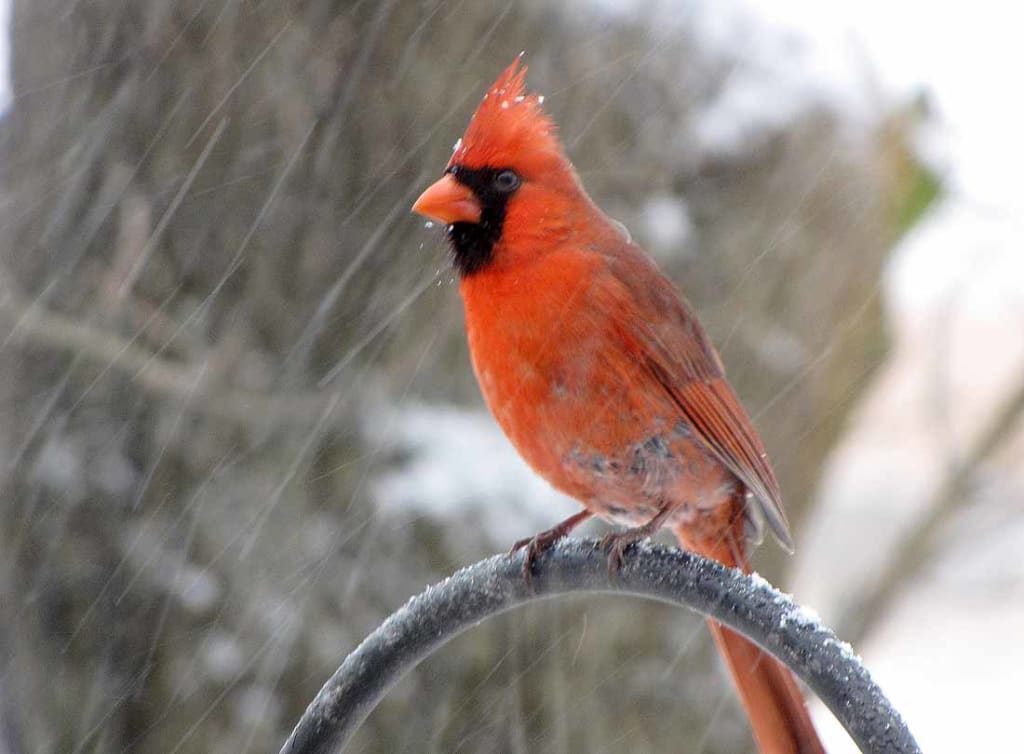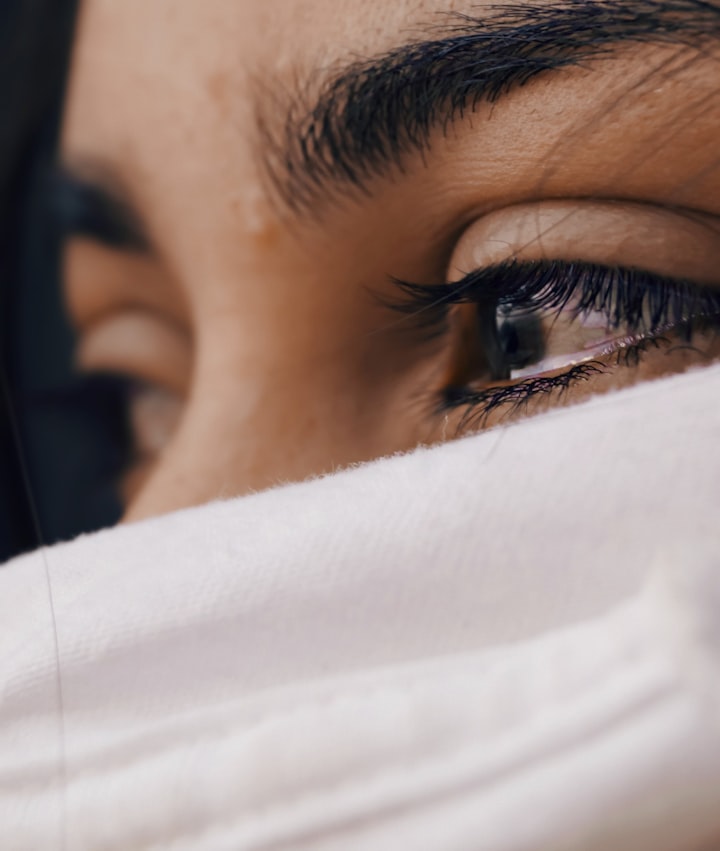
Somewhere outside my window a catbird repeatedly mews its tortured cry.
My backyard is a sort of aviary. There is a drainage ditch, between my yard and the houses behind me. Over the years living here I have seen many distinct birds. The catbird, for instance, I hear far more than I see, but I have caught sight of a few. Some house wrens made a nest inside my Victorian lamppost. Gulls and grackles pass through occasionally, all the way up here in Indiana. Black-capped chickadees, various woodpeckers. Tanagers, of both the summer and scarlet variety. Plenty of robins, finches, sparrows, starlings. Goldfinches usually migrate through in little flocks at some point, a wonder to watch, their bright yellow bodies darting in and out of the green foliage in the summer. There are also occasional hawks and many other birds, some I have not managed to identify. My favorites are the cardinals and the blue jays.
I like to think I attract so many birds to my yard because I do not manicure the lawn into AstroTurf like so many of my neighbors, and therefore create a more natural and robust habitat. I always have plenty of grasshoppers, crickets, as well as other bugs, grubs and worms which must make an excellent and continual source of food. Of course, I could just be excusing my lazy disregard for yard work, but, hey, why can't it be both?
What I love the most about the birds, though, is that I can always count on them to alight into my life, to draw my attention away, even if only for a fleeting moment, from the drab, gray landscape of my broken heart to a world of wonder right outside the window. The cardinal becomes my cardinal, the blue jay my blue jay, though I would never presume to cage them. They do not even know that I exist, yet they have gifted me their presence, and taken me briefly into a moment inhabited only by the living, breathing observation of their unconscious brilliance.
So too do I take solace in the innocence of my children. They drive me to do things for them I would never do of my own volition. Like put up Christmas decorations. I hate Christmas. I do not believe the mythology surrounding it, and find the consumer ideology into which it has degraded to be something decidedly vile. Yet I was a child once, unaware of the degree to which I was being manipulated by religious propaganda and corporate marketing campaigns—which are, after all, the same in principle, or lack thereof. Understanding that my children are as unaware as I once was, I capitulate to the pressure of fulfilling the tradition.
I curse and splutter under my breath as I drag out all the trinkets and baubles, but as I watch the kids hang the ornaments, my heart warms a little. Once the tree is lit, I become aware of a feeling of purity in the presence of its glow. I recognize this as the product of an association with the pure, childlike wonder that I revisit with the birds, that focus on the flash of color, the momentary distraction that spurs me down the path of life and away from the bleak reflections upon the decaying waste it leaves in its wake.
I recognize, in other words, the inner child who needed no more than a small, colorful display to find rapture in the moment.
I had thought that inner child lost, but the birds had been keeping him for me, protecting him, nurturing him in the darkness of my own conscious struggle. The poor child had only been waiting for the shell of the man to fall away so he could peek out at the world from which the man must work so hard to protect him.
Could it be that all of our fear and anxiety is an instinctual manifestation of our duty to protect and preserve that joy which the child represents? How and when will we find the time to let down our guard in a world where we must constantly weather the intrusion of necessity?
When we are children, we all want to grow up, but no one wants to grow old. No one wants to question their faith, let alone lose it. No one wants to face the bitter truth that Christmas is just a sales pitch exploiting our innocent tendency to be carried away by a beautiful, profuse display. It is only natural then that many of us blindly follow the tradition, for we are protecting the childlike wonder that we associate with it.
Nonetheless, reality sets in. Reality does not hurt our feelings. Our feelings betray us by locking us into a set of expectations that will never conform to reality. Some of us deal with this by dissociating, telling ourselves again and again that, after all, if we could be fooled by one illusion, we can be fooled by another, and we let ourselves believe that it is our suffering that is the illusion, and the joy which is the reality.
It is all real, the joy and the pain. Perhaps our great error lies in expecting it to come when we want it, rather than simply taking it as it comes. Is the random appearance of a colorful bird much different than the unscrupulous machinations of marketing executives and self-aggrandizing hierophants? Should I regard one with as much wonder as I do the other, knowing as I do that many human beings are as unconscious of my scrutiny as any other wildlife—in other words, equally unaware of the fact that I am observing them in their respective routines, judging them, categorizing them, trying to understand myself through the mirror of society, society through the mirror of myself?
Insofar as we are compelled to behave by others we are only free when we can choose not to capitulate. So, despite the fact that I hate Christmas, I love my kids more. I choose to honor that tradition to the degree that I feel I am honoring my love for my children. I draw the line at lying to them. I do not tell them Santa Claus or Jesus are real. I tell them that these are stories, the mythology of our culture. But I also try to make clear to them that the gifts, the decorations, the bright lights and shimmering trinkets, the festivities and feasts, are expressions of my personal love through the shared medium of that cultural tradition.
On the other hand, if we only capitulate to protect ourselves from the wrath of our culture, we are not free, and a culture that pours its wrath upon us for not following social convention or moral tradition is no more free than we are. Indeed, we must question whether culture, at a certain critical mass, can ever be free.
We think of certain birds, with their power of flight and their isolated lifestyles, as a symbol of freedom. Birds of prey especially. They are above us, beyond us. They get to see the world from the treetops, the mountain range, the sky. The smaller birds, the rodents in the field, and the other assorted animals upon which the eagle, hawk or falcon prey are not generally considered such symbols, because they do not retain their autonomy.
The unique dilemma of human nature and existence in modern times lies in finding a way to be free without becoming a predator. In some ways, we are to one another as the falcon is to the dove. As our distaste for physical violence has grown, we tend to transfer that same instinct to emotional manipulation. Enter again the unscrupulous machinations of marketing executives and self-aggrandizing hierophants.
No matter how much we attempt to sublimate that territorial, predatory instinct, it nevertheless emerges. We attempt to rectify this by seeking safety in numbers, but this safety is merely an illusion. For the greater the number, the easier it is for the predators to pick off the weak, to go unnoticed among the herd. Can we retain our childlike innocence while exercising the hyper-vigilance needed to recognize and protect ourselves from the evermore complex relationship between each other as predator and prey, each in our own right, each by our means, in our own way?
I don't have answers to these questions. I am stumbling down a dark tunnel, groping for purchase, seeking something that may not exist; but I will always have the birds, the children, and my own inner child to remind me of why I should not despair in my willingness to traverse this uncertain path. I shall always have wonder if I always have something about which to wonder.
About the Creator
C. Rommial Butler
C. Rommial Butler is a writer, musician and philosopher from Indianapolis, IN. His works can be found online through multiple streaming services and booksellers.






Comments (1)
I keep an open mind, I have questions about faith, but we must have begun somewhere. But where and by whom or what. We all have to choose for ourselves...but so many questions...unanswered. I see your pain and anguish on the eternal question.